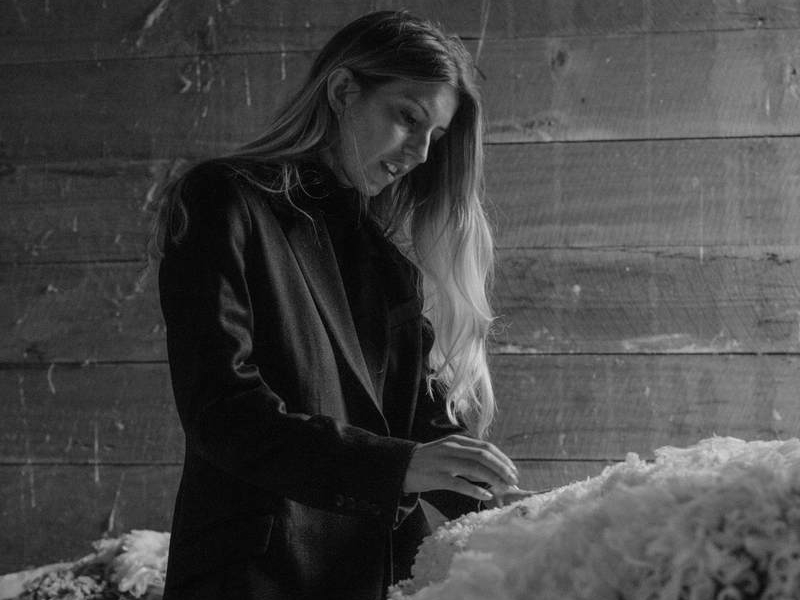Proctor is the Melbourne-based head of retail at The Thomas Group, a luxury diamond purveyor, and also the former National Retail Manager at Scanlan Theodore, a post she held for a decade-long tenure. Her viewpoint is particularly compelling – Proctor was instrumental in helping to shape the dynamic of Scanlan Theodore’s in-store experience at a time when the label couldn’t have been cooler. Just as creative director, Gary Theodore, was cementing his authority on the fashion scene by collaborating with edgy artists the likes of photographers Nan Goldin and Bill Henson, Proctor was fostering a shop floor culture built around warmth and realness.
"This is a moment to really rethink brand values. It has to be about more than just making a quick sale. Companies need to be profitable, of course, but they also have to offer something authentic, something deeper."
Mandy Proctor
"This is a moment to really rethink brand values. It has to be about more than just making a quick sale. Companies need to be profitable, of course, but they also have to offer something authentic, something deeper."
Mandy Proctor
Angela Briggs: To set the scene, Mandy and I met 13 years ago when she was National Retail Manager at Scanlan Theodore. I’ve always admired how she inspires her teams, her holistic understanding of the role, her exceptional self-awareness. Mandy is well respected in the industry – not just for her warmth and approachability, but also for the way she nurtures talent and builds relationships. I love the fact, too, that she has consistently focused on areas of development and is a big advocate of others: Mandy is the first to get behind you, congratulate you or be there for you when you need to talk something through.
And so, when you consider the whole whirlwind of COVID-19, I think it’s more important than ever to take the time to really celebrate these defining relationships in our lives, what we’ve learned from each other and the journey we’re going on together.
Mandy Proctor: Relationships are definitely key; they have played such a crucial part in my career. When I look back, I don’t think I really entertained the idea that you could have a proper career in retail. Having said that, I didn’t fall into the job either, I put every energy into my work, every step along the way. I’ve always strived to be part of a business where I could be involved with the owners and make a change. Prior to working at Scanlan, I was studying arts, my parents pushed me to get a degree. I think they had so many sleepless nights wondering what I was going to make of myself, they came from a family of teachers, lawyers, and so on, but I knew I could prove it to them.
Angela Briggs: You went on to work at Scanlan Theodore for 10 years. What you brought to the brand was invaluable.
Mandy Proctor: First up, I loved the job, and isn’t that really what it all comes down to – passion. I started out as a store manager in the Little Collins boutique [in Melbourne]. Scanlan was in its heyday, and the store was always at full capacity. I would say that I brought energy and consistency to the role. It was just a wonderful time to work there, and I grew with the job too, and worked my way up. I always put my hand up for new opportunities – they could have sent me anywhere, I was just so eager to learn, always extending myself.
For me, it was never about trying to make a leap into head office, I just understood what the team needed to feel motivated and to get results. It all came down to having great energy and providing honest and supportive feedback. When I look back, my proudest achievements were the relationships I built with team members, and then their individual successes that followed.
"Scanlan was in its heyday, and the store was always at full capacity. I would say that I brought energy and consistency to the role. It was a wonderful time to work there, and I grew with the job too."
Mandy Proctor
"Scanlan was in its heyday, and the store was always at full capacity. I would say that I brought energy and consistency to the role. It was a wonderful time to work there, and I grew with the job too."
Mandy Proctor
Angela Briggs: I would go so far as to say that you really advocate for people, and you advocate for change. You helped push Scanlan into a new era, and you also set the bar for customer experience. For me, it’s all about the people – the people in your team, and also the customers who come into your store each day, they become like family as well.
Mandy Proctor: Absolutely. I think we realised early on that we had to build a team that was approachable. When our customer came in, we had to be the girlfriend that you could trust, it wasn’t about the sale as such, it was about building a connection, having an opinion – and, yes, that almost went too far in the sense that customers would come in just to chat, catch up, sometimes not at all interested in buying anything. But then, it was about encouraging the staff to be creative, to enjoy the job and to be engaged.
Angela Briggs: Moving forward, how are you analysing the impact of the pandemic on business? Obviously lockdown has been a huge issue, but I think it’s also fair to say that some retailers in Australia – particularly those with a large number of bricks and mortar stores – have been flailing for a long time.
Mandy Proctor: If there’s any positive to come from the crisis, it’s change. I’m excited that our industry is now having to become more agile, and adapt and evolve, and find ever more creative ways to connect with customers. It’s a time to be innovative. Equally, it’s a moment to really rethink brand values. It has to be about more than just making a quick sale. Companies need to be profitable, of course, but they also have to offer something authentic, something deeper. I haven’t purchased a single clothing item since March and I’m not in any rush to. For me, it’s more important to understand the ethics behind a brand, I guess I am prioritising making a true connection. With everything that’s happening in the world, I’m also interested in how a brand treats its own staff – wouldn’t it be interesting if a retail team could Google-review the very brands they work for, in the same way that customers share opinions on the service they’ve received?

Bill Henson Oneroi and Erin Wasson by Nan Goldin images via Scanlan Theodore.
Angela Briggs: Obviously integrity and authenticity are key, but how do you go about cultivating positive brand values through your staff?
Mandy Proctor: For me, it’s important to ensure a potential new team member has clear values from the very beginning. Ultimately, you want to set them up for success, but their values have to be aligned with the company’s. It all comes down to the culture of the business. I think you need to invest 50% of your time in cultivating good values. This was something that I spent a great deal of time working on at Scanlan, ensuring everyone was on the same page, really honing in on how we wanted customer’s to experience the brand, we considered everything right down to the packaging and how we would take the time to carefully wrap a purchase, almost in a ceremonial way, it had to feel special. If you don’t spend time working on your company’s culture and what it stands for, it can so easily slip away. It also has to be a team effort, everyone should feel empowered to contribute.
"When our customer came in, we had to be the girlfriend that you could trust, it wasn’t about the sale as such, it was about building a connection, having an opinion. [...] It was about encouraging the staff to be creative, to enjoy the job and to be engaged."
Mandy Proctor
"When our customer came in, we had to be the girlfriend that you could trust, it wasn’t about the sale as such, it was about building a connection, having an opinion. [...] It was about encouraging the staff to be creative, to enjoy the job and to be engaged."
Mandy Proctor
Angela Briggs: I think we’re seeing a lot of brands fall over right now because they lack that authenticity, especially in light of the movement surrounding Black Lives Matter. Diversity in hiring practices is an important issue.
Mandy Proctor: Absolutely. Which once again comes down to genuine values. We can do better. I’d say, first and foremost, you have to have a clear vision as to what you want to achieve, a long-term strategy. I do believe that if you treat your employees with great respect, love and care, they will in turn become completely engaged in the business and your company will thrive.
I feel really passionate about creating diversity within a team: individuals with varied professional experience and life experience, from different cultures and backgrounds, with diverse family structure, different strengths and passions, youthful and mature, the creative and the more conservative. Diversity within a team not only creates an interesting and thriving environment for those within it, but it also attracts diversity in the customers who connect with it. I think a lack of team diversity can make customers feel excluded, not welcome and intimidated. A true leader will naturally create diverse teams and surround themselves with diverse staff that will keep them personally challenged, progressive and relevant. Care and understanding, at a very human level, is also imperative.
In my current role [as Head of Retail for The Thomas Group] I really emphasised the need to be there for our team during lockdown, even though we were facing weeks of shutdown and not making a dollar. If you’ve got a great team then you need to hold on tight to that. I realised it was about remaining positive, being there for everyone, in order to reinforce the message that we were going to come out strong. From a staffing point of view, as soon as India closed, we couldn’t access diamonds, which meant we couldn’t continue production. In my mind I thought it was important to continue to be productive, though – I called every staff member and asked them to name a dream project they had always wanted to work on within the organisation: what’s the one thing you feel really passionate about that doesn’t exist yet? What will bring you a bit of satisfaction right now?
It was about working to our strengths and trying to have a little fun in the process. I wanted the team to still feel connected to the brand. I am a big believer in being a cheerleader. I do think for every single bit of effort and energy you put into a business, you will be rewarded in return – Ange, I know you share a similar philosophy.
"I really emphasised the need to be there for our team during lockdown, even though we were facing weeks of shutdown and not making a dollar. If you’ve got a great team then you need to hold on tight to that."
Mandy Proctor
"I really emphasised the need to be there for our team during lockdown, even though we were facing weeks of shutdown and not making a dollar. If you’ve got a great team then you need to hold on tight to that."
Mandy Proctor
Angela Briggs: Community is everything. I’m most proud of how we navigated through the crisis by coming together and supporting each other. In tough times, there needs to be genuine support, and that often means compromise, being flexible, staying connected and having real empathy. And you are right, it is so very important to have a positive outlook. I think it’s about continuing to move forward, while also taking on the life lessons that we have learned in recent times.
Can you tell us about some of the other challenges in retail? For instance, I know there can be a lack of understanding when it comes to the role of a store manager. We both know that an amazing store manager is someone who understands the financials and the operations of the business, they also breathe the creative, the product, yet when I’m interviewing for this role, I’m consistently meeting with candidates who are, ultimately, looking to move off the shop floor.
Mandy Proctor: … which drives me crazy. Being on the floor is one of the aspects of my role that I really enjoy. If you don’t want to be on the floor, then don’t look for a job in retail. For so many years I was offered positions in head office, and I just felt that I would completely lose touch with our audience if I did that. If you build a brand around a team of strong store managers, then the brand has strong foundations and greater customer experiences as a result. Your store manager is your brand’s frontline PR person at the end of the day.
Angela Briggs: Yes, a great store manager holds an incredible amount of brand IP. I think it’s important to really encourage communication between the store and head office and build an alignment between them, they shouldn’t be two separate entities. The store manager should be feeding information back to head office, what’s working, what’s not, customer feedback, that’s powerful information, head office should be working with it.
E-commerce, moving forward, is another important topic. The roles that I’m most proud to have placed over the last 18 months are those heads of E-commerce who have had such an enormous impact on their brand throughout this period. Being able to easily engage with the customer online, having a diverse product range, and having an authentic messaging is everything.
Mandy Proctor: The E-Commerce space really excites me. There is so much scope when it comes to the digital landscape and I agree, the messaging has to be authentic, not disingenuous. In the UK, there’s a lot of investment in creating curated experiences online. I feel as though here in Australia it can be a bit of an afterthought. We need to elevate that space, really invest in good social media strategy and omnichannel content, and make it as desirable as the rest of a brand’s messaging.
"Being on the floor is one of the aspects of my role that I really enjoy. If you don't want to be on the floor, then don't look for a job in retail. [...] Your store manager is your brand’s frontline PR person at the end of the day."
Mandy Proctor
"Being on the floor is one of the aspects of my role that I really enjoy. If you don't want to be on the floor, then don't look for a job in retail. [...] Your store manager is your brand’s frontline PR person at the end of the day."
Mandy Proctor
Angela Briggs: Another subject I’m obviously very interested in discussing with you is reviewing team performance – do you agree that employers can often handle this with ambiguity or avoid it all together. I’m asking because I know this is something you do very well, you’re not afraid of a performance management conversation.
Mandy Proctor: I speak so honestly. For the most part, that works for me. I’m genuine when I say that I like to get the best out of my staff, and above all I want them to have great successes in their roles. Obviously I handle any critical feedback with kindness and care, and I’m mindful to follow up and check in with that person later, but in my mind there’s no hard conversation. I think it’s worse if you leave something unsaid. I look at performance reviews as an opportunity to set up staff members for greater success. That said, it isn’t for everyone, it can be nerve-wracking, but you do have to summon your courage and have the hard conversations when you’re in business. It goes back to protecting those core values – I think the most important thing is being able to leave your ego at the door, you’re in the job together with your team. Huge success comes from being transparent, having a positive spirit, a brilliant work ethic and good energy.




